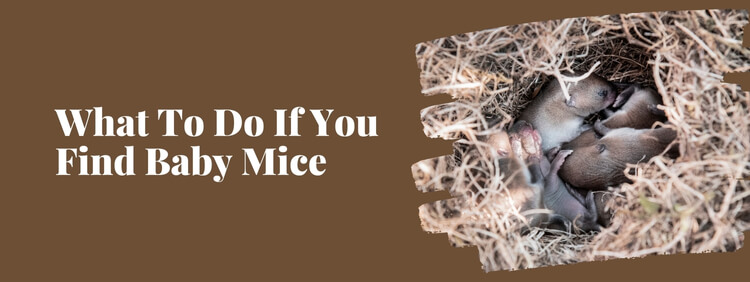 Stumbling upon a squeak may tug at your heartstrings or prompt an uneasy shiver, especially when you discover the source: baby mice nesting quietly in the hidden corners of your home. These tiny, wide-eyed beings have a way of inciting both concern and curiosity. As a homeowner, you're faced with the delicate task of managing mice removal in Toronto while pondering the needs of these vulnerable little pests.
It's a rare encounter that obliges a gentle, informed approach, respecting the tenderness of life that even the smallest beings possess – understanding the lifespan of a mouse plays a crucial role in this.
This article by our Truly Nolen team in Toronto offers a compassionate insight into handling a situation where the fragile intersects with the domestic, guiding you through a course that is both humane and practical.
Stumbling upon a squeak may tug at your heartstrings or prompt an uneasy shiver, especially when you discover the source: baby mice nesting quietly in the hidden corners of your home. These tiny, wide-eyed beings have a way of inciting both concern and curiosity. As a homeowner, you're faced with the delicate task of managing mice removal in Toronto while pondering the needs of these vulnerable little pests.
It's a rare encounter that obliges a gentle, informed approach, respecting the tenderness of life that even the smallest beings possess – understanding the lifespan of a mouse plays a crucial role in this.
This article by our Truly Nolen team in Toronto offers a compassionate insight into handling a situation where the fragile intersects with the domestic, guiding you through a course that is both humane and practical.
Recognizing the Signs of Baby Mice Infestation
Finding baby mice in your home, especially in a major city like Toronto, is a common occurrence. The first indication of their presence usually involves the detection of certain signs that give them away. Being aware of these signs is crucial, as quick action can help mitigate the potential health risks that these rodents may pose. Here are some signs that indicate the presence of baby mice in your home:- Tiny Droppings: One of the first telltale signs of a baby mouse infestation is the presence of tiny, grain-like droppings. Despite their small size, baby mice produce a substantial amount of waste, and their droppings are often concentrated in areas where they feed and nest.
- Bite Marks: Baby mice have sharp teeth, making bite marks on food packages, furniture, and even electrical wires a common sign of their presence. These marks are smaller than those left by adult mice and often go unnoticed until a significant amount has accumulated.
- Squeaking sounds: Be on the lookout for subtle, high-pitched squeaking sounds. Baby mice are not silent; they often communicate with each other in squeaks that are too quiet for most humans to notice unless they're listening for them.
- Nests: Tiny nests made from soft materials like shredded paper, fabric, or plant matter in hidden, undisturbed areas of your home are indicative of a baby mouse infestation. Check for such nests in tucked away places like behind appliances and within wall cavities.
The Potential Risks of Baby Mice in Your Home
Baby mice, despite their tiny and seemingly harmless size, pose a number of serious risks for homeowners. Predominantly, these risks relate directly to health hazards, damage to households, and the potential for a rapidly expanding infestation. Whisking your hand across your kitchen countertop only to brush against droppings signals the presence of rodent activity. These droppings, benign as they seem, often carry bacteria such as Hantavirus Pulmonary Syndrome and Salmonellosis. Both ailments represent substantial health threats. Contaminated food, adverse allergic reactions, and skin diseases are also a fair concern, reiterating the need to decisively act against such infestations. Mice have sharp rodent teeth that never cease growing, compelling them to chew constantly whether the target is electrical wires, fibreglass insulation, or your favourite pair of shoes in an under-stair cupboard. The consequential damage can have a domino effect leading to circuit failures, increased risk of fires and costly repair expenses. Lastly, mice reproduce at an astonishingly rapid rate, with female mice capable of giving birth to a dozen babies every three weeks. As such, a small infestation can quickly balloon into a larger issue if not addressed promptly. Remember, ignoring the presence of baby mice in your home feeds into these risks. It is important to take immediate action to deter mice from expanding their family in your home.
Avoiding Common Missteps When Discovering Baby Mice
Discovering baby mice in your home can stir an amalgamation of reactions; curiosity, fear, distress, or even sympathy for the tiny, defenceless creatures. However, it's crucial to set aside these emotions and approach the situation with a level-headed, informed plan of action. Here are significant missteps you should consciously avoid:- Resisting immediate action: It's vital not to postpone dealing with a mice infestation. The longer you wait, the more time they have to breed and spread throughout your house, exacerbating the issue.
- Opting for DIY solutions: While the internet is brimming with home-based remedies to handle pests, it's not advisable to rely on these methods solely. A professional pest control solution, like Truly Nolen, is always a superior choice.
- Removing without identifying the nest: Simply removing the mice you find is not enough. It's imperative to locate their nest to ensure all mice, including any unseen babies, are taken care of.

